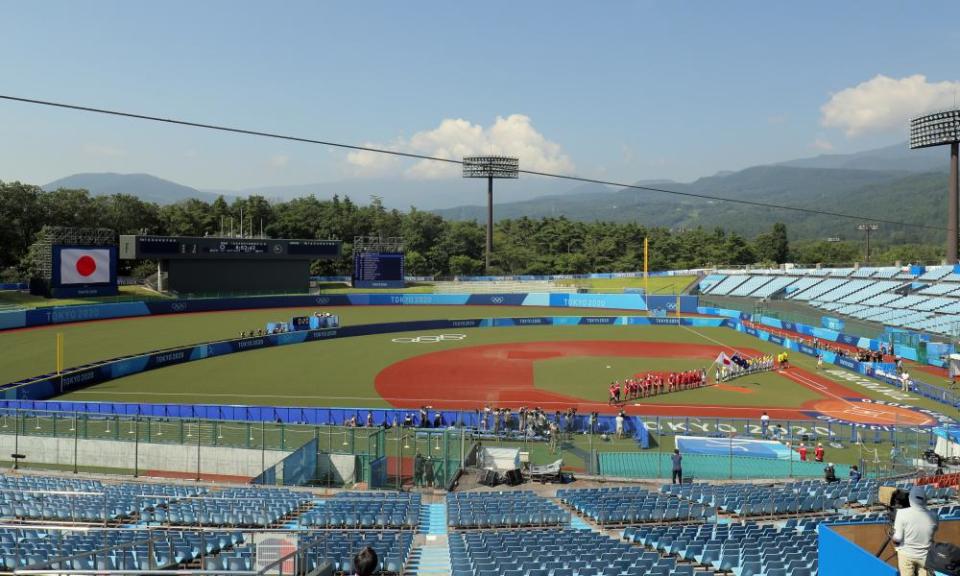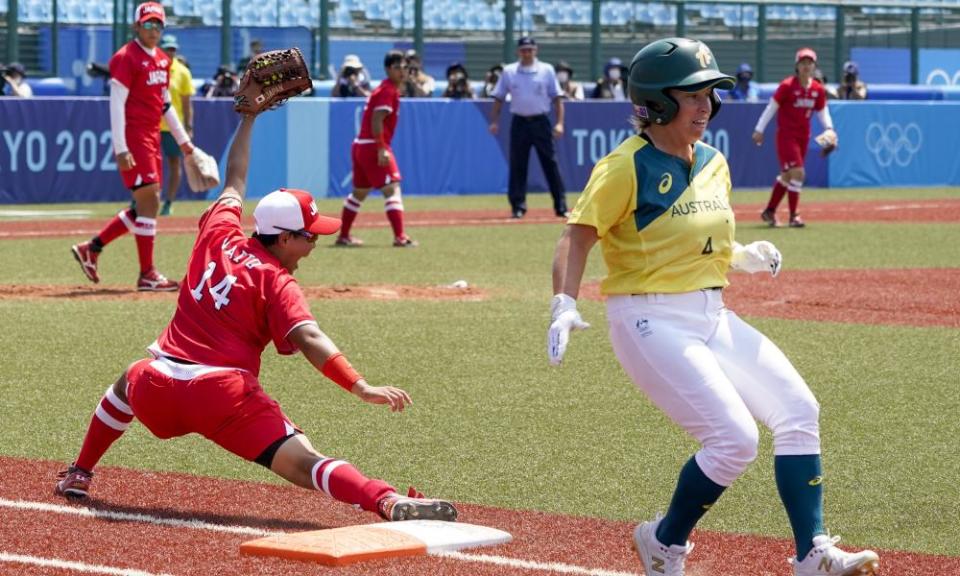No entry: symbolism in Fukushima as Olympics begin in empty stadium

After a year’s delay and months of rancour … finally, some Olympic sport. Few will remember the details of Yukiko Ueno’s opening pitch to Michelle Cox in Japan’s softball match against Australia in Fukushima on Wednesday morning. But her delivery, witnessed by the organising committee president, Seiko Hashimoto, signalled that the most bizarre Games of modern times really are happening.
Depending on how deep the world’s reserves of optimism run, the first action of the 2020 Games, could mark a turning point for the troubled Olympics or, more likely, bring only ephemeral relief from the viral cloud that hangs over the host city, Tokyo.
Related: Australian team enjoy softball’s Olympic return despite mercy-rule defeat
There was, though, a symbolism to Japan’s 8-1 victory over Aussie Spirit that predates the pandemic by almost a decade. In one sense, Japan’s Olympic project came full circle at Fukushima Azuma Baseball Stadium, located in a region whose proximity to tragedy inspired its pitch for the “recovery Games”. Forty miles east of the stadium stands the site of the world’s worst nuclear accident since Chernobyl. On the afternoon of 11 March 2011, a magnitude-9.0 earthquake triggered a towering tsunami that destroyed huge swaths of Japan’s north-east coast, killing more than 18,000 people and sweeping away entire towns.
The same waves crashed into the Fukushima Daiichi nuclear power plant, triggering meltdowns in three of its reactors and forcing tens of thousands of people to flee their homes while plant workers, firefighters and soldiers battled to cool the reactor cores. Ten years on, many are still unable, or willing to return to neighbourhoods declared safe for human habitation.
The decision to award Fukushima softball and baseball matches was intended to prove to the world that the wider region had recovered from the tsunami and that the nuclear crisis was “under control,” as the then Japanese prime minister, Shinzo Abe, told the International Olympic Committee in 2013 in a last-ditch effort to rescue Tokyo’s bid. But the virus’s recent surge in the host nation, centred on Tokyo, meant that once convincing sign of recovery – the communal enjoyment of sport – was missing in Fukushima.
Until last week, just over 7,000 local people were to attend softball and baseball events in Fukushima, where they would have watched Japan launch an impressive defence of their Olympic gold in Beijing, the last time the sport featured at the summer Games. But with local fans banned at the insistence of Fukushima’s governor, Masao Uchibori, the atmosphere was provided by shouts of encouragement from the dugouts, while cicadas nestling in the stadium’s mountainous backdrop battled it out with a circling police helicopter in the decibel stakes. Any sighs of relief from Olympic officials were diplomatically stifled.
The teams lined up for national anthems observed in near silence, watched by a large contingent of Japanese reporters and officials sheltering beneath a small section of the stadium not exposed to the blazing morning sunshine. After Uchibori overturned organisers plans to allow a limited number of spectators, hundreds of local volunteers were told their serviced were no longer needed. “I wanted to show my gratitude for the support the world showed us after the 2011 earthquake and tsunami, but now I won’t get the chance,” one of them told the Nikkei business newspaper on the eve of the softball opener.
Local voices banished from the stands found expression through young peach trees planted along the stadium concourse, where messages from local children encouraged athletes to “go for gold”. At the entrance, marigolds and begonias had been planted in the shape of the Olympic rings.

Before the match, journalists and TV crews passed through multiple security checks, while a sign at the stadium entrance spelled out the Games’ opening day message to the public: “No entry.” Sports officials were led by police and security motorcades along empty roads straddled by verdant rice paddies before passing through the VIP entrance of a sports complex devoid of spectators.
“The Games were supposed to be an opportunity to show the current status of Fukushima, and we had various plans in mind before the decision to ban spectators,” said Seiichi Anbai, the chairman of the Fukushima city softball association, according to the Kyodo news agency. “Our emotions are polarised because, considering the coronavirus situation, it is sort of understandable, but at the same time, we wanted the Games to take place in front of an audience.”
A Fukushima hotelier, who asked not to be named, felt the region had been exploited. “The government has taken advantage of Fukushima right from the start,” she told the Guardian, referring to the decision to begin the Japan leg of the torch relay to J-Village, a football training complex that functioned for years as a logistics hub for crews working to control and decommission the damaged nuclear plant 12 miles away. “They said they would put on the Olympics for the sake of Fukushima, but I don’t think many people here feel like that’s really happening. It all comes down to politics.”
Kunitoshi Abe, a Fukushima resident who makes traditional Kokeshi dolls, said: “Now we’re in the middle of the pandemic, it doesn’t feel like the ‘recovery Olympics’ at all. The Olympics itself isn’t really in the mood for the Olympics.”
Fukushima has come a long way since wild animals roamed streets where atmospheric radiation made it too dangerous for residents to return. But it’s recovery – if that is even possible – will continue long after the softball and baseball Olympians have gone home.
In the next couple of years, the operator of Fukushima Daiichi – Tokyo Electric Power – will begin releasing more than a million tonnes of contaminated water into the Pacific ocean, a move opposed by local fishermen who have spent years repairing the reputational damage to their industry. The plant itself will take decades to decommission, and at a cost of billions of dollars.
Japan’s prime minister, Yoshihide Suga, was among those clinging to the hope that a softball match would help convince a worldwide TV audience that life in Fukushima had returned to normal. But the opening day of the Tokyo Games, held in the shadow of coronavirus, ended up conveying a different message: that collective trauma unleashed by a nuclear accident, and now by a global pandemic, was never going to be extinguished by the swing of a bat.

 Yahoo Sport
Yahoo Sport 





































